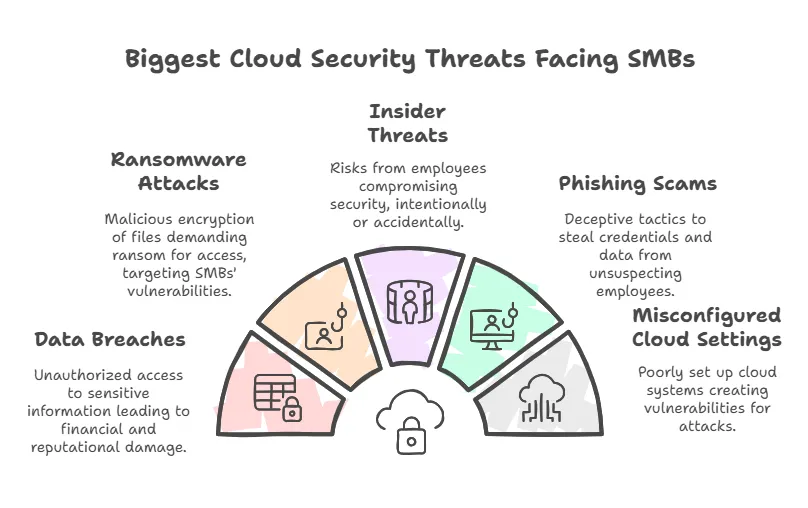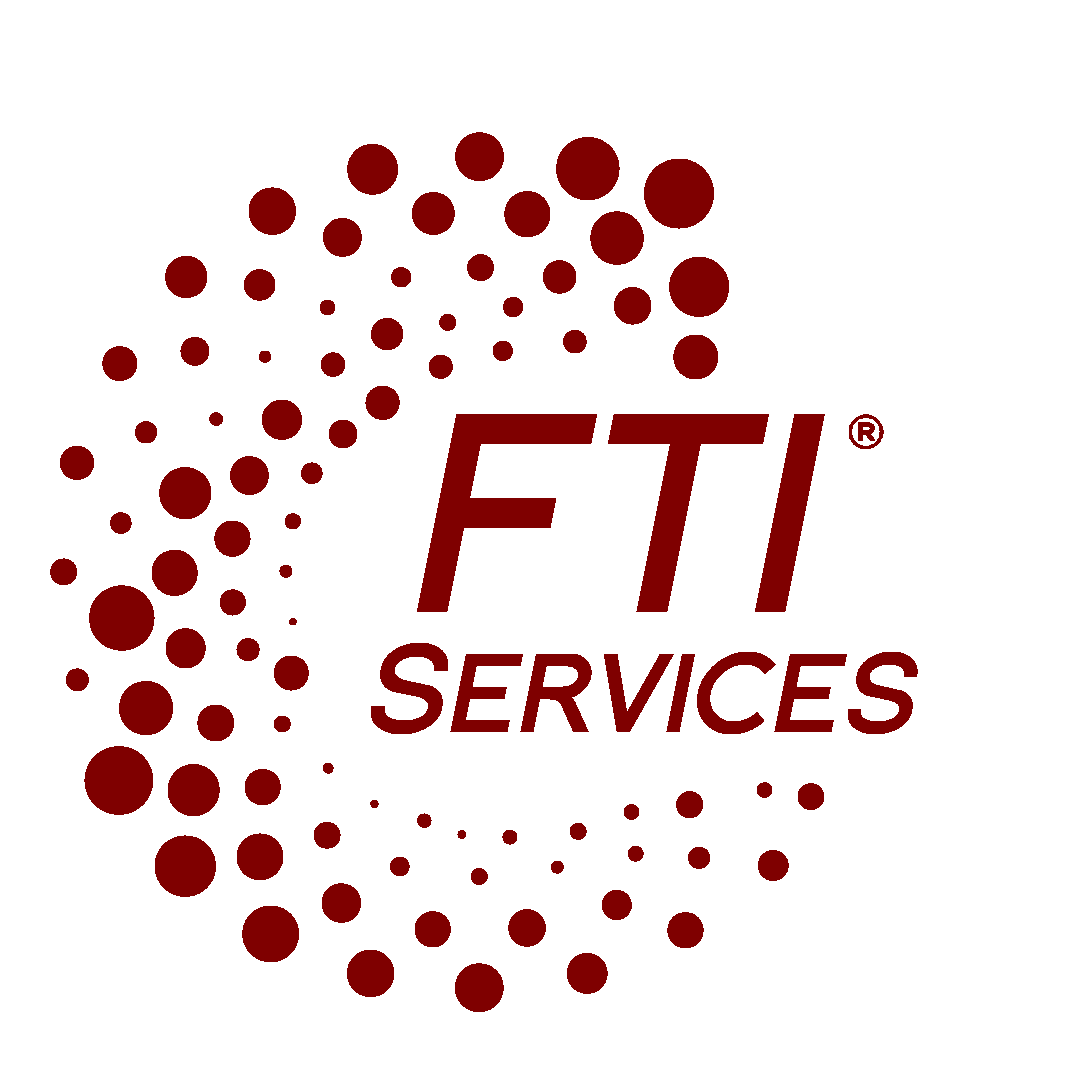Imagine waking up to find your business’s critical data locked away, inaccessible, and held ransom by cybercriminals!
This nightmare scenario is becoming increasingly common, especially for small and medium-sized businesses (SMBs). In fact, a staggering 60% of small businesses that suffer a cyberattack shut down within six months. As cyber threats evolve in sophistication, SMBs must recognize the pressing need to fortify their cloud security measures.
In this blog, we’ll break down the most common cloud security risks that SMBs face and provide practical steps to fortify your defenses without straining your budget. Let’s dive in.
| “Cloud security isn’t just about keeping hackers out—it’s about building trust with your customers, ensuring business continuity, and protecting what you’ve worked so hard to build.” says Jason Cary, VP of Sales at FTI Services |
Why Cloud Security Matters for SMBs
The shift to the cloud has transformed the way SMBs operate, enabling them to compete with larger enterprises and scale their operations without massive infrastructure investments. However, this convenience comes at a cost—without the right security measures, your data could be vulnerable to cybercriminals looking to exploit weaknesses in your cloud environment.
The Rising Threat of Cyberattacks on SMBs
Cybercriminals don’t just target large corporations; they often go after SMBs, believing they have fewer security measures in place. The statistics are alarming:
- 43% of cyberattacks target small businesses.
- 82% of ransomware attacks affect small businesses.
- The average cost of a data breach for SMBs is $1.24 million.
If you don’t prioritize cloud security, you could face severe financial losses, legal liabilities, and irreversible damage to your reputation.
The Biggest Cloud Security Threats Facing SMBs Today
Cyber threats are constantly evolving, and SMBs are prime targets because cybercriminals assume smaller businesses lack the resources to maintain enterprise-level security. Without proper protections in place, a single breach could lead to financial ruin, reputational damage, and even business closure.
To stay secure, you need to be aware of the most common and dangerous cloud security threats affecting SMBs today. Here’s what to watch out for:
1. Data Breaches: The Silent Revenue Killer
A data breach occurs when cybercriminals gain unauthorized access to sensitive information, such as customer records, financial data, or proprietary business details. For SMBs, a single data breach can have devastating consequences—leading to financial loss, legal liabilities, and loss of customer trust.
How Do Data Breaches Happen?
- Weak passwords and lack of multi-factor authentication (MFA). If employees use weak or reused passwords, hackers can easily gain access to cloud systems.
- Phishing attacks that trick employees into revealing credentials. Cybercriminals often send deceptive emails designed to steal login information.
- Poorly secured cloud storage. If cloud databases are left publicly accessible or misconfigured, attackers can retrieve sensitive data without resistance.
Prevention Tips:
1. Use end-to-end encryption for sensitive data in storage and transit.
2. Implement multi-factor authentication (MFA) for all logins.
3. Regularly audit access permissions to ensure only authorized personnel can access critical information.
2. Ransomware Attacks: Held Hostage in the Cloud
Ransomware is one of the most destructive cyber threats SMBs face today. These attacks encrypt your files, making them inaccessible until a ransom is paid—often in untraceable cryptocurrency.
Why Are SMBs Prime Targets?
- SMBs often lack robust cybersecurity defenses. Hackers know that many small businesses don’t have sophisticated threat detection systems.
- SMBs are more likely to pay the ransom. Many small businesses don’t have adequate data backups, leaving them with little choice but to comply with demands.
- Cybercriminals can deploy ransomware via phishing emails. Employees may unknowingly open an email attachment or click on a link that installs ransomware.
The Cost of Ransomware
- Ransomware payments in 2023 surpassed the $1 billion mark, the highest number ever observed.
- 43% of all cyberattacks in 2023 targeted small businesses
How to Protect Your SMB
- Regularly back up your data using a 3-2-1 strategy (three copies, two storage types, one offsite).
- Train employees to recognize suspicious emails and avoid clicking on unknown links.
- Use endpoint security solutions that detect and block ransomware before it can spread.
3. Insider Threats: The Danger Within
Not all cyber threats come from external attackers. Sometimes, employees—whether intentionally or accidentally—can compromise cloud security.
Types of Insider Threats
- Malicious Insiders: Disgruntled employees or contractors may steal company data, delete files, or introduce malware to damage the business.
- Negligent Insiders: Employees may accidentally expose sensitive data, such as by using weak passwords, sharing login credentials, or clicking on phishing links.
Real-World Example
A former Tesla employee sabotaged the company’s cloud systems by creating scripts that stole gigabytes of proprietary data and shared it with competitors.
Prevention Tips:
- Limit access controls using Role-Based Access Control (RBAC).
- Use cloud monitoring tools that alert you to suspicious behavior.
- Implement employee cybersecurity awareness training to minimize mistakes.
4. Phishing Scams: Don’t Take the Bait
Phishing is one of the most widespread and effective cyberattack methods. These scams use fraudulent emails, messages, or websites to trick employees into giving up login credentials, financial information, or other sensitive data.
Common Phishing Techniques Used Against SMBs
- Email Spoofing: Attackers pose as trusted contacts (e.g., your IT department, cloud provider, or CEO) and request sensitive information.
- Fake Login Pages: Employees receive emails prompting them to log into a fake Microsoft 365 or Google Workspace page—stealing their credentials.
- SMS or WhatsApp Phishing: Attackers send urgent messages with links to malware-laden sites.
Why It Works
- Employees are busy and don’t always scrutinize emails carefully.
- Hackers mimic trusted brands or use fear tactics to manipulate victims.
- Business leaders and finance teams are particularly targeted in Business Email Compromise (BEC) attacks.
How to Defend Against Phishing
- Use AI-powered email filtering tools to detect and block phishing attempts.
- Train employees to verify email sources before clicking on links.
- Enable multi-factor authentication (MFA) to prevent unauthorized logins.
5. Misconfigured Cloud Settings: An Open Door to Attackers
Cloud security is only as strong as its configuration. Many SMBs assume their cloud provider takes care of security, but misconfigurations account for 31% of all cloud security breaches (IBM Security).
Common Misconfiguration Mistakes
- Leaving databases exposed to the public. Many cloud storage breaches happen because databases were not set to “private.”
- Using default security settings. Hackers know the default settings of cloud services and use them to gain access.
- Not enabling logging or monitoring. If an attack happens, SMBs often have no record of how it occurred.
Example of a Cloud Misconfiguration Disaster
Capital One suffered a data breach when an improperly configured AWS S3 bucket exposed 100 million customer records. This same mistake has impacted many SMBs as well.
How to Fix It:
- Regularly audit cloud security settings to ensure they’re properly configured.
- Use automated cloud security tools like Microsoft Secure Score or AWS Security Hub.
- Implement identity and access management (IAM) policies to control who can access cloud resources.

How SMBs Can Strengthen Their Cloud Security Without Breaking the Bank
Many SMBs worry about the cost of cybersecurity, but effective security doesn’t have to be expensive. Here are five cost-effective ways to enhance cloud security:
- Enable Multi-Factor Authentication (MFA).
- Regularly train employees on security best practices.
- Encrypt all sensitive data stored in the cloud.
- Perform regular security audits.
- Back up critical data to a secure offsite location.
Cyber threats aren’t going away, so staying proactive is your best defense. Invest in the right security tools, educate your employees, and consider partnering with experts in cloud security to keep your business safe.
| Further, Explore How Managed IT Services Can Benefit Your Business:
How Managed IT Services Work For Your Business Staff Augmentation vs. Managed IT Services: Making the Right Choice for Your Business |
The Role of Managed Security Services in Cloud Protection
Many SMBs struggle to maintain in-house cybersecurity expertise. This is where Managed Security Service Providers (MSSPs) come in.
MSSPs provide:
- 24/7 monitoring to detect threats before they cause damage.
- Incident response to minimize downtime after an attack.
- Regular security updates to protect against the latest threats.
By outsourcing your cloud security to an MSSP, you get enterprise-level protection without the massive costs of an in-house cybersecurity team.
Comparison Table: Cybersecurity Risks vs. Solutions for SMBs
| Cloud Security Threat | Impact on SMBs | Cost-Effective Solution |
| Data Breaches | Financial loss, legal penalties, loss of customer trust | End-to-end encryption, MFA, access controls |
| Ransomware Attacks | Business downtime, ransom payments, data loss | 3-2-1 backup strategy, anti-ransomware tools |
| Insider Threats | Leaks of sensitive data, sabotage, compliance issues | Role-Based Access Control (RBAC), employee training |
| Phishing Scams | Credential theft, unauthorized financial transactions | AI-powered email filtering, MFA |
| Misconfigured Cloud Settings | Exposure of confidential data, compliance violations | Cloud security audits, automated compliance monitoring |
Eliminate Cloud Security Risks with FTI Services
Cyber threats are evolving, and SMBs remain prime targets. From ransomware attacks and phishing scams to insider threats and misconfigured cloud settings, the risks are real—and costly. A single breach can cripple your operations, erode customer trust, and result in financial disaster.
You don’t have to be the next victim. By implementing multi-layered security measures, educating your employees, and leveraging expert cloud security services, you can protect your business from the growing wave of cyber threats.
Don’t wait for a security breach to take action. Now is the time to secure your cloud environment, safeguard your sensitive data, and ensure business continuity.
FTI Services provides end-to-end cloud security solutions that protect SMBs from ransomware, data breaches, and insider threats—without breaking the bank. With proactive monitoring, expert-led security audits, and tailored defence strategies, we help businesses like yours stay ahead of cyber threats. Strengthen Your Cloud Security → Talk to an Expert today.
| Learn More About Our Services Near You: |


